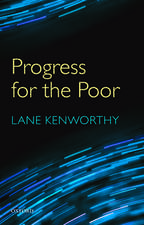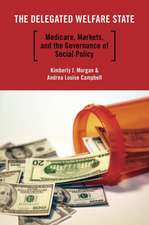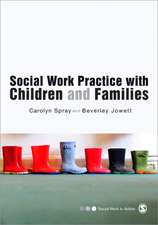The Welfare State as Piggy Bank: Information, Risk, Uncertainty, and the Role of the State
Autor Nicholas Barren Limba Engleză Hardback – 10 mai 2001
Preț: 564.41 lei
Preț vechi: 852.59 lei
-34% Nou
Puncte Express: 847
Preț estimativ în valută:
108.00€ • 113.05$ • 89.89£
108.00€ • 113.05$ • 89.89£
Carte tipărită la comandă
Livrare economică 19-25 martie
Preluare comenzi: 021 569.72.76
Specificații
ISBN-13: 9780199246595
ISBN-10: 0199246599
Pagini: 316
Ilustrații: numerous tables and figures
Dimensiuni: 165 x 243 x 22 mm
Greutate: 0.58 kg
Ediția:New.
Editura: OUP OXFORD
Colecția OUP Oxford
Locul publicării:Oxford, United Kingdom
ISBN-10: 0199246599
Pagini: 316
Ilustrații: numerous tables and figures
Dimensiuni: 165 x 243 x 22 mm
Greutate: 0.58 kg
Ediția:New.
Editura: OUP OXFORD
Colecția OUP Oxford
Locul publicării:Oxford, United Kingdom
Recenzii
Presents a cogently argued account of the principles underlying Welfare State policies and their practical consequences ... I have not seen the economic and public policy distinction between compulsory and post-compulsory education set out so clearly and convincingly before.
The book is a fruitful blend of economic modelling and institutional analysis ... An impressive feature is the author's discussion in each section of "twenty first century issues" and the final part of the book on "The Welfare State in a Changing World" ... this book goes to the heart of the economic issues surrounding the welfare state, and stimulates the reader to further thought.
If I were asked to design a social policy course from scratch ... I would certainly include Nicholas Barr's book as a key text ... this is a stimulating and successful text, a good example of the contribution economic analysis can make to social policy teaching and study.
Barr's book can be strongly recommended to anyone with an interest in the development of social policy ... Excellent and timely.
The book is a fruitful blend of economic modelling and institutional analysis ... An impressive feature is the author's discussion in each section of "twenty first century issues" and the final part of the book on "The Welfare State in a Changing World" ... this book goes to the heart of the economic issues surrounding the welfare state, and stimulates the reader to further thought.
If I were asked to design a social policy course from scratch ... I would certainly include Nicholas Barr's book as a key text ... this is a stimulating and successful text, a good example of the contribution economic analysis can make to social policy teaching and study.
Barr's book can be strongly recommended to anyone with an interest in the development of social policy ... Excellent and timely.
Notă biografică
Nicholas Barr has a BSc and MSc from the London School of Economics and a PhD from the University of California, Berkeley, where he was a Fulbright Scholar. He is Reader in Economics at the LSE, the author of numerous books and articles on the economics of the welfare state and the finance of higher education including "The Economics of the Welfare State" (OUP, 3rd edn, 1998) and "Labor Markets and Social Policy in Central and Eastern Europe" (OUP, 1994), and a member of the editorial board of the "International Social Security Review".










